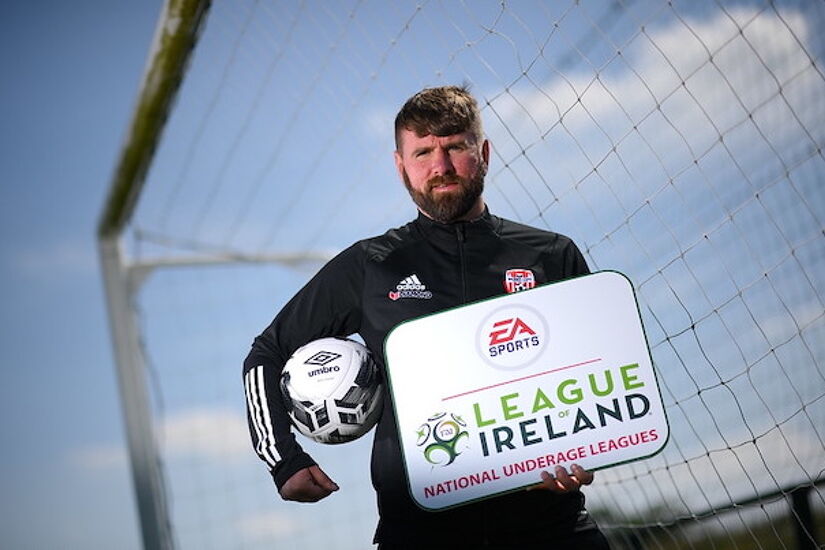Paddy McCourt: ‘I give them the best possible advice on how to be mentally and physically ready’

Derry City technical director Paddy McCourt during a EA SPORTS National Underage League Media Day at FAI Headquarters in Abbotstown, Dublin. Photo by Stephen McCarthy/Sportsfile Credit: Extratime Team (ETPhotos)
Nobody knows the passion for football in Derry quite like Paddy McCourt.
The ‘Derry Pele’ once lit up the Brandywell with his silky skills before moving on to play for the Northern Irish national team and a host of top clubs such as Celtic and Brighton & Hove Albion.
Now, in a city where laneways between terraced houses are arenas for 5-a-side tournaments, the retired winger is tasked with building an academy to harness the raw talent on Foyleside.
McCourt’s job is looking over Derry’s under age teams (13s, 15s, 17s and 19s) while managing the transition of youth players into the senior team.
“A huge part of my role is working with the academy and being around the players making the transition from the academy to the first team. I give those players the support that they need,” he explained.
“I give them the best possible advice on how to be mentally and physically ready to make the step up from academy football to first team football.”
The transition has become almost seamless in Derry over the last decade with a number of big name players, such as Republic of Ireland international Ronan Curtis and Dundalk’s Michael Duffy, having come through the club’s academy.
“It’s great to have those lads around the city,” he says.
“Those lads now are in their mid to late twenties. Look at the lads we have now. Ronan Boyce, Jack Malone, Patrick Ferry, Brendan Barr, and Caolan McLoughlin all came in the last 18 months.
“For our academy players to see these lads, it is fantastic. It’s fantastic for the players to see that if they buy into what they are being told to do, if they train hard and perform, the pathway is there to have a career at Derry City and God knows where after that.”
All this happens in the Brandywell, in the heart of Derry, a city which over 150,000 people call home.
Such a small population means there is a family like atmosphere around the city. It’s the kind of town where everyone knows everyone and famous faces, like Ronan and Michael, are never too far away.
While all the ingredients are there to build a successful academy, McCourt knows that he is working with one hand behind is back.
“The location is an advantage for us as we don’t have that many rival clubs,” he explained.
“If you look at the actual amount of people in the city, we’re at an actual disadvantage. If you look at Dublin, there’s six or seven clubs going after the same player. But they have over a million people to choose from. There’s only 150,000 people in Derry.
“We have an advantage one way, but on the other hand, it kind of evens itself out in terms of not having the same amount of people to choose from”
A small population means that there is always going to be competition between different sports.
As someone who lives and breathes for football, McCourt would never dishearten his players from following other sporting passions.
“We wouldn’t discourage our players from playing other sports. We would encourage it,” he says.
“We would say ‘as long as it doesn’t get in the way of your football’. If we train three nights a week and the young player wants to play another sport on the other two nights, we would encourage that.”
“What we don’t want is on a Saturday getting a text from a parent saying ‘Johnny can’t make it today because he had a baseball game’. We say football has to come first. We have no problem if it doesn’t clash, especially with younger players.”
“It does gets to a stage around the 16/17 mark, when it looks like a player is going to make it as a professional footballer. Then it is their choice of what sport they play. But, we certainly wouldn’t discourage kids from playing multi-sports, as long as it doesn’t discourage games.”
Watch: Johnny Kenny scores three as Sligo sail past Bohs https://t.co/v6AwqNjGolpic.twitter.com/sWy3iOIYBz
— Extratime.com (@ExtratimeNews) June 27, 2021

